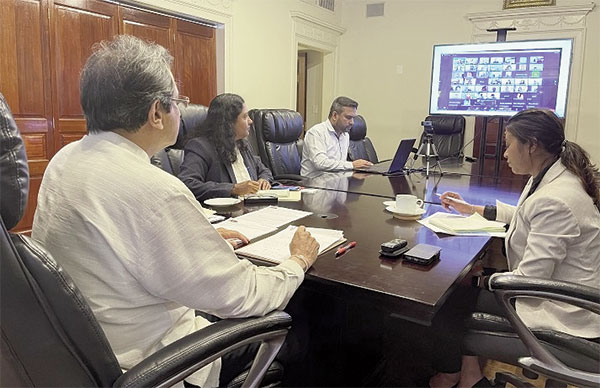News
US-based Overseas Sri Lankan Academic and Research Collaboration Network launched

The Inaugural Meeting of the ‘US-Sri Lanka Academic and Research Collaboration Network’(USLARCN) was held virtually on 15 August 2021. The Network was launched by the Embassy of Sri Lanka in Washington D.C with a view to connecting with the academic community within the US, and leveraging their support towards Sri Lanka in academic collaboration, co-mentoring and facilitating access to US learning resources for Sri Lankan university students. This further expands the reach of the Pan US Overseas Sri Lankans (OSL)Network launched by the Embassy on 31 January 2021, with the broader aim of supporting OSL activities and leveraging their support towards Embassy efforts at realizing the interests of Sri Lanka in the US in political advocacy, economic empowerment, socio-cultural engagement, as well as in bringing unity within the SL community and reaching out to ‘Friends of Sri Lanka’.
Following the response received to a notice which was placed on the Embassy website and circulated among the OSL Network nearly two months ago, over 130 OSLs who expressed interest were clustered into 12 groups in the areas of Cultural Studies and Media; Business and Finance; Early Childhood Education; Team Science and Talent Development; Environmental Studies; Nutrition and Food Science; Chemistry, Physics; Engineering;, Computer Science and IT; Medical Sciences;, Social Sciences and Sri Lankan Studies.
Delivering the opening remarks, Ambassador of Sri Lanka to Washington D.C. Ravinatha Aryasinha commended the significant achievements of Sri Lankan academics in the US and the pride they bring to Sri Lanka. He emphasised the importance of bringing the US-based Sri Lanka origin academic community together, to both support the education system and students living in Sri Lanka, as well as to ensure that those involved at the academic and policy levels in the US had a more nuanced understanding of Sri Lanka, and of Sri Lankans in the US. Noting that up to the end of the Cold War, institutions such as the East-West Center in Hawaii and a few other US Universities had catered to this need, he said that today such a full understanding was imperative so that we respond not only to ‘events’ in each other’s countries but to the related dynamic ‘processes’ as a whole. Ambassador Aryasinha said that he had, during a visit to Hawaii in May 2021, discussed this aspect with both the East-West Center and Asia-Pacific Center for Security Studies (APCSS) so that a better appreciation of the full spectrum of multifaceted relations between Sri Lanka and the US can be better reflected in future collaboration. He hoped that the USLARCN will also take up the challenge to revive this tradition through their individual and collective endeavours.
Delivering the keynote address on the occasion, Emeritus Professor Wimal Dissanayake of the University of Hawaii and Leader of the Cultural Studies and Media Group, commended Ambassador Aryasinha for the new initiative under the Pan OSL Network, and recalled the different phases of US-SL Education Collaboration since the 1950s. He said that in the past there had been a steady stream of students, journalists, academics, policymakers and service personnel, who have attended long term degree programmes as well as seminars, and had benefitted from and contributed to the considerable cross fertilisation of views that took place, significantly around the East-West Center. However, he noted that “what you have today is a pale shadow of what it was 20 or 30 years ago, but still thanks to the efforts of the Ambassador, I think we are trying to revive it”. Noting that at present Sri Lankan scholars in this network are approximately 80% from the Natural Sciences, 15% from the Social Sciences and 5% from the Humanities, Professor Dissanayake recommended three conceptual criteria that could help future efforts; that it be inter-disciplinary in nature, that it focuses on knowledge exchange and knowledge utilization, and functions as a ‘Network’ with a structure but also flexibility.